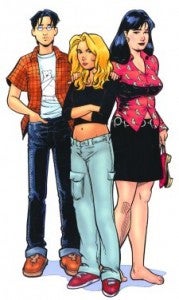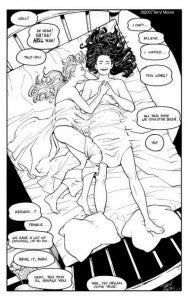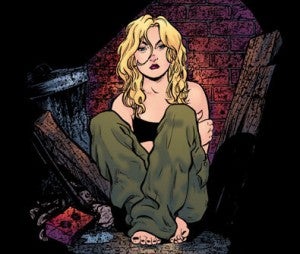Russ Burlingame
Senior Staff Writer, ComicBook.com
For those of you who complain when reporters or bloggers talk about personal experience in a piece, I apologize up front. But read on, as I don't think the fact that it comes from a personal perspective changes the overall message.
I'm a child of the media, you have to understand.

I mean, not literally. Actually, I'm the child of a couple of center-right, workaholic parents. But the result of that is that often, the clearest and most concise advice I got on a lot of issues was through books, movies, music and TV.
And comics.
My views on race relations, for example, were irrevocably changed by an interview I did for my high school newspaper with Rubin "Hurricane" Carter, the middleweight boxer arrested in New Jersey in 1967 and convicted of a triple-murder he did not commit.
Carter spent 18 years in prison before the U.S. Supreme Court overturned his guilty verdict, saying that he had been convicted as a result of a case that rested on "racism rather than reason" and "concealment rather than disclosure." Try being a blissfully-ignorant, middle-class white teenager who thinks everything's been just peachy for thirty years, and then talking to a guy like that for an hour.
In the wake of the silly little tempest in a teapot that has been the discussion on homosexuality in comics over the last few weeks, I got to thinking about how I went from being a right-wing Christian who argued, and honestly believed, that all "the gays" were going to Hell, to being someone who actively and aggressively argues against that rather silly and embarrassing worldview.
The answer, when I came to one, was three words long: Strangers in Paradise.
Terry Moore's Strangers in Paradise is one of the great works in American sequential art; over the course of many years, Moore gave us three beloved characters--David Qin, Francine Peters and Katina Choovanski--who were more fully fleshed-out than most people I knew in real life. It was easy to really, truly care about these characters, their trials and hopes--and I did.
At the time, I was active in the Church of Christ, and I remember having these long, embarrassing-in-hindsight debates about gay people and how they just haven't tried hard enough to be straight. I was the kind of person that I now want to spray with a fire hose, and I was doing it all "on God's behalf." I was never mean about it (I don't think), just determined, but I'm still incredibly ashamed of the way I talked to people all those years ago, and I thank my good friend Logan Bretschneider for spending literally hours on the phone trying to help me get my head screwed on right.
Luckily for me, I stumbled across Strangers in Paradise when I was in college; I interned at Wizard Magazine and a guy named Andy down the hall was a huge supporter of the series. He convinced me to give it a try and I was almost immediately hooked.
I loved David Qin, who was a great point-of-view character for me. Not only was he the series' only male lead, and a bit of a bewildered one at that, which is a good way to be when you're relating to newcomers who join the series forty issues in or so--but he was a devout Christian in the way that Ned Flanders used to be, back before it took over every aspect of his personality. David was just a nice, quiet guy who believed and let it guide him, but who didn't need to talk about it everytime his mouth was open, and as a Christian I appreciated that.
David was also in love with Katina (Katchoo for short) who was, in turn, in love with Francine. The three of them all spent a lot of time together and occasionally lived together throughout the series, but the bottom line was, they all loved each other very much, all in different ways, but David wanted to be with Katchoo forever, and Katchoo wanted that from Francine--who was raised a :good Christian girl" who doesn't kiss other girls (and anyway wanted kids), and so had a lot of problems coming to grips with her sexuality and the fairly obvious fact that what she really wanted and needed was Katchoo.
And these imminently likable characters that Moore created, along with his clever writing and heartfelt ear for dialogue, changed something very fundamental about the way I perceived homosexuality. When you love someone, it changes your perspective on the issues that directly impact that person and, as crazy as it sounds, at age 21 or so I really loved David, Francine and Katchoo.
 I remember distinctly the day that I stopped being bothered that Katchoo--a character I liked and admired for a number of in-story reasons--was in love with another woman and started rooting for Francine to come around. It really was just like a switch went off and I realized that I'd been reading the comic all wrong up til then.
I remember distinctly the day that I stopped being bothered that Katchoo--a character I liked and admired for a number of in-story reasons--was in love with another woman and started rooting for Francine to come around. It really was just like a switch went off and I realized that I'd been reading the comic all wrong up til then.
For a long while, my own hangups made that impossible for me to say, and I kept hoping that she would end up with the lovable David (whose status as "great guy" never changed as my own views evolved, largely because David was not a judgmental prick). I justified my thinking to myself first that it was what God would want and then that David was a nice guy and deserved a good life, but ultimately it was about being uncomfortable around homosexuality, something I'd never encountered in life and only knew anything about from what they told us in church and at the Christian summer camp where I would spend the summers until I was 19.
Luckily, I grew up, and I have my (now) friend Terry Moore to thank for that in no small part.
Would I eventually have become a better, more tolerant person without Strangers in Paradise? Probably. The way I used to behave and perceive the world ran contrary to my personal instincts and moral compass even back then, and I've long past grown out of the stage where I'm willing to let "church folk", even the ones I love dearly, tell me how I should think. But it would have been a process and it's unlikely that it would have happened so quickly or that I would have been so immediately self-aware in terms of the preposterous way I was behaving.
So for all of you out there who are dragging out the old "These things have no place in comics--comics should be about escapism and real-world issues don't belong" argument, just remember this: Terry Moore never once did a "political" story about Katina being a lesbian...
(...well, I mean, there was that thing she did with the Senator, but that's a whole other thing...)
...Moore managed to make Katchoo and Francine characters who mattered to the readers--even the ones who went in with their own baggage--and that in doing so he helped at least one person not only to overcome his own prejudices, but hopefully to become a more decent human being to those around him.
If turning (one of a dozen) Green Lantern(s) gay can help even one gay young reader to become more comfortable in his own skin, I'm all for it. And even if it can't, if it can make one emotionally-stunted college guy realize that gay people are, well, people--I'm all for that, too.
And, failing that, if James Robinson can make Alan Scott a compelling character with an interesting personality and a heroic nature...well, then who cares what he does in his time off?


No comments:
Post a Comment